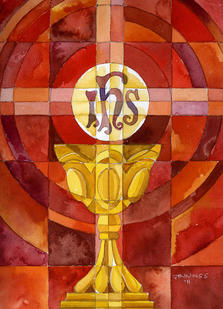
John 6:51-58
Sunday, August 19, 2018
First Congregational Church of Cheshire
© the Rev. Dr. James Campbell
John 6:51-58
I am the living bread that came down from heaven. Whoever eats of this bread will live forever; and the bread that I will give for the life of the world is my flesh.” The Jews then disputed among themselves, saying, “How can this man give us his flesh to eat?” So Jesus said to them, “Very truly, I tell you, unless you eat the flesh of the Son of Man and drink his blood, you have no life in you. Those who eat my flesh and drink my blood have eternal life, and I will raise them up on the last day; for my flesh is true food and my blood is true drink. Those who eat my flesh and drink my blood abide in me, and I in them. Just as the living Father sent me, and I live because of the Father, so whoever eats me will live because of me. This is the bread that came down from heaven, not like that which your ancestors ate, and they died. But the one who eats this bread will live forever.”
At the very first church I served, I was called upon to officiate at the wedding of a church member who was marrying a Catholic. The Catholic bride had agreed to be married in a Protestant Church, as long as we had some of the trappings of a Catholic wedding. One of those was that the bride and groom wanted communion. “That’s fine,” I said, “as long as everyone else in the sanctuary is offered communion too.” That was one of my Protestant trappings.
The big day arrived and the church was full of people – about half Catholic and half Protestant. Since it was a wedding, and since I was so young and inexperienced, I didn’t think to ask anyone to assist me with communion. And I hadn’t really thought about what it would mean, logistically, for me to serve 300 people by intinction, all by myself.
When we got to the Communion portion of the wedding, the Protestants tore off a modest sized piece of bread, dipped it in the cup and discreetly put it in their mouths. But not the Catholics. They too tore off a piece of bread, but pooped it directly into their mouths. And then to my utter shock, they grabbed the cup and drank, and some of them deeply. The Protestants, who were standing in the line behind, witnessed this, got confused, and thinking that they must have been doing it wrong all these years, also began to drink from the cup. And I began to panic as I contemplated what it would mean if the cup ran dry.
Just when I thought all was lost, a woman from my church approached. She tore off a piece of bread and then tried to grab the cup, but this time I held on firmly and whispered, perhaps a little too loudly considering that I was wearing a microphone: “No Olga! Dip it! Dip it!” Well, thank God Olga did. And then like clockwork, all the other Protestants, copycats that they were, began to do the same. And the day was saved. There was enough of Jesus for everybody.
Communion was very complicated that day. But truth be told, it’s complicated on most days. It’s one of those things that we Christians do but that we don’t talk about very much. And maybe the reason we don’t talk about it is that we’re not quite sure what we think about it. Because it’s complicated. What began as a simple meal that Jesus shared with his disciples has become a sacrament and, as such, a major point of disagreement between those of us who follow Jesus. We’ve even fought wars over it! Some of us believe that there is a mystical element to it all – that somehow Christ is present in the meal in ways that that transcend what our minds can understand. Others see it as a simple memorial – a time to remember the life and saving acts of Jesus. Some see it as a foretelling of the end of the age, when all God’s children will sit down together at the same table of peace. And some Protestants, like our Quaker sisters and brothers, believe it solely to be a spiritual event, not requiring bread and wine at all, but rather an inner communion of the spirit. And in our crazy, wonderful United Church of Christ, we have folks who believe all of those things… and more.
So, the Eucharist or Holy Communion or the Lord’s Supper is complicated. And today’s lesson from John’s gospel makes it even more so. Jesus speaks very strange words, rather embarrassing to hear. “Jesus said to them, "Very truly, I tell you, unless you eat the flesh of the Son of Man and drink his blood, you have no life in you. Those who eat my flesh and drink my blood have eternal life, and I will raise them up on the last day; for my flesh is true food and my blood is true drink. Those who eat my flesh and drink my blood abide in me, and I in them.” Pretty shocking, right? But hold onto your hats because the Greek word here for eat is “trogo” which has the connotation of munching or gnawing, with an implied desperation. And, for the first hearers anyway, Jesus’ words also would have been heard by some as blasphemy. The drinking of blood is strictly forbidden in Hebrew Scripture (Gen. 9:4, Lev. 3:17; Deut. 12:23). In addition, in antiquity the idea of eating someone’s flesh was a metaphor for great hostility. It was a way to insult someone.
In verse 60, which we did not read today, Jesus’s disciples responded to all this flesh and blood talk by saying: “This teaching is difficult. Who can accept it?” Indeed, who can? And so, to try to make it more acceptable, we have written beautiful and rather vague liturgies, trying to tone down this untamed, hard to understand idea.
But even as we tone it down, if you pause to really think about it, communion remains shocking. Martin Copenhaver, former pastor of the Wellesley Congregational Church in Massachusetts and currently president of Andover Newton Theological School at Yale, tells this story: “On one occasion when I repeated Jesus' familiar words, "This is my body broken for you. This is my blood shed for you," a small girl suddenly said in a loud voice, "Oh, yuk!" The congregation looked horrified, as if someone had splattered blood all over the altar - which, in effect, is just what the little girl had done with her exclamation.”[1] And I wonder: did that little girl simply say out loud what some of us are thinking?
So, we have established that Communion is complicated. And yet, it still draws us. The invitation to eat and drink with Jesus or of Jesus continues to woo people, even those of us who don’t know what to say or think or believe about it. And I think it woos us because it’s visceral and earthy and mysterious and intimate.
Some of you have met my best friend Jim, the Presbyterian minister who preached my Installation here in April. In a recent conversation, he said something like this: “It’s interesting. Presbyterians are not like they used to be. They’re no longer satisfied with a strictly intellectual approach to the faith. In the old days, a good sermon was sufficient. People simply wanted a faith they could understand intellectually. But that doesn’t seem to be enough anymore. More and more of the people at my church are looking for mystery and awe, as well as intellectual stimulation. They want more prayer and more silence. And they want more Communion. In other words, they want to engage their bodies and spirits as well as their minds. They’re trying to feed the whole person – and it’s personal.”
And maybe that is, at least in part, what Jesus was trying to communicate when he shocked his friends with his flesh and blood talk. Maybe it was an invitation to deeper intimacy with him. Maybe it was an invitation to take something of his own self into our own flesh and blood; to become one with him, to participate on some deep level in the Incarnation.
You know, it’s not unlike what a mother does when she breast-feeds her child. She gives of her own body, her own substance, in order to transfer her life to her child. And it’s very personal.
The power of the Eucharist is not, in the end, about bread and wine and words and churches and pastors and ritual. It’s about getting very, very close to Jesus.
So, think whatever you will about communion. There is probably no right answer about exactly what it is. But whatever you think, don’t get hung up on it. Jesus’s strange, strong words are not about some kind of doctrine. His words are about the relationship he longs to have with each one of us. His strange, strong words are an invitation, as Martin Copenhaver says, to “…receive Jesus, the whole Jesus, (so that) his life clings to (our) bones and courses through (our) veins.” [2]
And it doesn’t get any more personal than that.
[1]Copenhaver, Martin. http://day1.org/4043-eating_jesus. Accessed August 14, 2018
[2]Ibid


 RSS Feed
RSS Feed